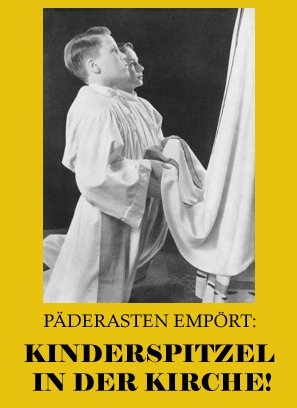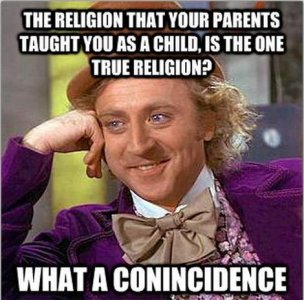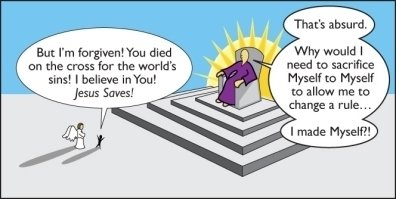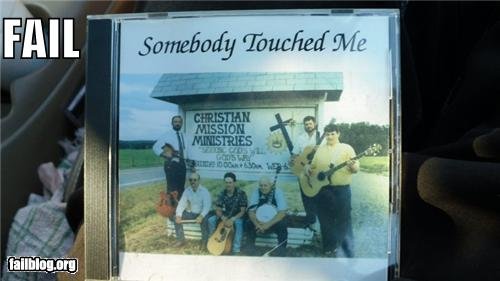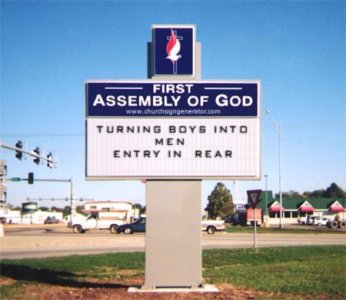Re: Funny anti-religious Internet pics
The "Byzantine" empire started to rot right after the first VIIth century crisis, when Heraclius had to turn a "Roman" empire of Antiquity into a power able of surviving the Middle Ages. Your vision represents the XIXth century historiographic myth of continuity in the Western world, when the reason why the Roman empire had been split in two and kept that way, as well as all the petty fights all through the first half of the Middle Ages, and until the cold shoulder in the final times around the first half of the XVth century, show that the Byzantine empire had become and was perceived in the developing of the West and in the subsequent political games, as an irritating, heretical, despicable "Oriental" power, acting as a buffer zone between the West and the muslim East.
Again, the Dark Age term is applied to the two different eras making up the so-called Middle Ages, while it truly has nothing to do with the urban revival and all it economical and cultural consequences from the XIth-XIIth century on, but most certainly applies to the centuries of turmoil and "readjustment" after the definitive decay of urban civilization even in Constantinople, urban life in the IXth century was nothing like during Late Antiquity, say the Justinian era.
Clientelism was part of the roman society, but you are mistaking it for the estate burocratic system that sustained the Roman empire. in fact, the crisis of the Republic era showed that that system could not sustain the growth, social, economical and political, of the Roman state. To say that feudalism was a "natural evolution" of the old Roman imperial system, it's like saying that criminal gangs are a "natural evolution" from a well-adjusted society. It's not an "evolution from", it's what remains when you scrap the top, and you could hold more rightfully that the system was precisely a burocratic cap, never well-adjusted with the population and the system below, but you could say the same with the USA, any Chinese state, imperial or commie, or any empire-sort of state or federation, no matter how it be named.
That academical view and judgement tries to link feudalism with the previous system as a means of justifying everything coming down to modern Western civilization down from Classical Antiquity through the Middle Ages, and it was made, like most humanistic crap that people today take for granted, when they don't plainly ignore it, in the XIXth century that wanted to offer a righteous lineal, simplistic explanation, logical and even, of what could rather be considered a Frankensteinish creation according to those elements (Roman system, feudalism...) that had nothing to do with each other as whole political systems beyond personal relationships in a restricted circle.
The steady flourishing of Constantinople as Western Europe fell is just another myth, and it's funny that you try to deny one myth (to the extent to which it IS a myth, as I discuss below) with another one.There was no dark age in Europe after the fall of the Western Roman Empire.
The Eastern Roman Empire continued to flourish (as, Byzantium) until its fall to Ottoman conquest in the 15th century.
The structure of the (Catholic) church through its monasteries provided schools, universities, welfare for the poor and hospitals that today would be provided by government whereas, the king collected taxes to pay for his court's comfort and to provide for an army and avoided interfering in matters administered by the church.
Likewise, in the Byzantine Empire the (Orthodox) church provided similar services that served the common good, leaving the emperor to focus on protecting the empire.
The great universities of Europe were originally established as religious institutions such as Oxford University, and Paris University. According to legend Oxford university was founded in 872 when Alfred the Great happened to meet monks there and had a scholarly debate that lasted several days. In reality it grew up in the 12th century when famous teachers began to lecture there and groups of students came to live and study in the town. The university was given a boost in 1167 when, for political reasons, the English king ordered all students in France to return home continuing their education at Oxford.
The "Byzantine" empire started to rot right after the first VIIth century crisis, when Heraclius had to turn a "Roman" empire of Antiquity into a power able of surviving the Middle Ages. Your vision represents the XIXth century historiographic myth of continuity in the Western world, when the reason why the Roman empire had been split in two and kept that way, as well as all the petty fights all through the first half of the Middle Ages, and until the cold shoulder in the final times around the first half of the XVth century, show that the Byzantine empire had become and was perceived in the developing of the West and in the subsequent political games, as an irritating, heretical, despicable "Oriental" power, acting as a buffer zone between the West and the muslim East.
Again, the Dark Age term is applied to the two different eras making up the so-called Middle Ages, while it truly has nothing to do with the urban revival and all it economical and cultural consequences from the XIth-XIIth century on, but most certainly applies to the centuries of turmoil and "readjustment" after the definitive decay of urban civilization even in Constantinople, urban life in the IXth century was nothing like during Late Antiquity, say the Justinian era.
Clientelism was part of the roman society, but you are mistaking it for the estate burocratic system that sustained the Roman empire. in fact, the crisis of the Republic era showed that that system could not sustain the growth, social, economical and political, of the Roman state. To say that feudalism was a "natural evolution" of the old Roman imperial system, it's like saying that criminal gangs are a "natural evolution" from a well-adjusted society. It's not an "evolution from", it's what remains when you scrap the top, and you could hold more rightfully that the system was precisely a burocratic cap, never well-adjusted with the population and the system below, but you could say the same with the USA, any Chinese state, imperial or commie, or any empire-sort of state or federation, no matter how it be named.
That academical view and judgement tries to link feudalism with the previous system as a means of justifying everything coming down to modern Western civilization down from Classical Antiquity through the Middle Ages, and it was made, like most humanistic crap that people today take for granted, when they don't plainly ignore it, in the XIXth century that wanted to offer a righteous lineal, simplistic explanation, logical and even, of what could rather be considered a Frankensteinish creation according to those elements (Roman system, feudalism...) that had nothing to do with each other as whole political systems beyond personal relationships in a restricted circle.






